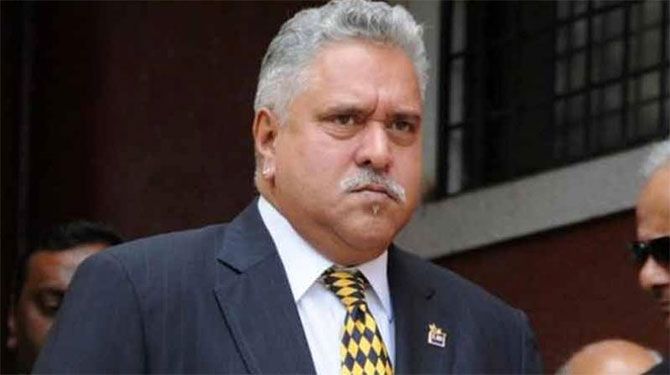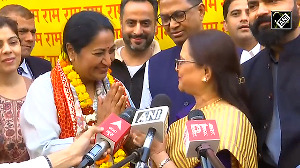India had given a formal extradition request for Mallya as per the Extradition Treaty between India and the UK through a note verbale on February 8

Embattled Indian tycoon Vijay Mallya, who has been declared a proclaimed offender, was on Tuesday arrested in London by Scotland Yard on India's request for his extradition on fraud charges.
Senior Indian officials described his arrest as the first salvo in the case, which will now involve a legal process in the United Kingdom to determine if Mallya can be extradited to India to face charges in Indian courts.
The arrest comes weeks after Indian Finance Minister Arun Jaitley had indicated that Mallya's extradition would feature in his talks during his visit to the UK.
The 61-year-old liquor baron, wanted in India for defaulting on loans, was arrested after he appeared at a central London police station on Tuesday morning.
The flamboyant businessman, who once called himself 'The King of Good Times", was released on bail a few hours later.
He was released after providing a bail bond worth 650,000 pounds.
Until his next hearing on May 17, Mallya must follow Britain's extradition rules, which include a requirement that he remain at the address provided to the court.
The Indian government had revoked Mallya's Indian passport last year. He must surrender that revoked travel document and is also forbidden from possessing any international travel documents, according to well-placed sources in the UK.
Mallya has also been directed by the court that he remain in contact with UK authorities, with his mobile phone accessible at all times.
"Officers from the Metropolitan Police's Extradition Unit this morning arrested a man on an extradition warrant. Vijay Mallya was arrested on behalf of the Indian authorities in relation to accusations of fraud," Scotland Yard said.
The Metropolitan Police said Mallya was arrested after attending a central London police station.
He appeared at Westminster Magistrates' Court in London and was seen walking out with his legal team a few hours later after being granted bail.
"It was a voluntary action. He will be out in a few minutes," said a member of Mallya's team at the court, without giving any further details of the bail conditions.
"Usual Indian media hype. Extradition hearing in Court started today as expected," Mallya tweeted soon after getting the bail.
In New Delhi, Minister of State for Finance Santosh Kumar Gangwar said, "We are now assessing the facts how we can bring him back into the country and start judicial proceedings against him."
The government, he said, will leave no stone unturned to bring to justice anyone indulging in financial irregularities.
The external affairs ministry said that India is in touch with the United Kingdom on the issue of extradition of Mallya.
Holding that Mallya's arrest in London by Scotland Yard was in connection with the request by the government to the UK authorities for his extradition, external affairs ministry spokesperson Gopal Baglay said legal process in this regard is underway in the UK.
"The two governments are in touch in this context," he added.
Mallya, whose now-defunct Kingfisher Airlines owes more than Rs 9,000 crore to various banks, had fled India on March 2, 2016.
The Indian government has since revoked his Indian passport but he has repeatedly dismissed all charges against him.
In January, an Indian court ordered a consortium of lenders to start the process of recovering the loans.
India had given a formal extradition request for Mallya as per the Extradition Treaty between India and the UK through a note verbale on February 8.
Earlier in January this year, a Central Bureau of Investigation court had issued a non-bailable warrant against Mallya in the Rs 720-crore IDBI Bank loan default case. He is the owner of a Formula One team.
While handing over the request, India had asserted that it has a "legitimate" case against Mallya and maintained that if an extradition request is honoured, it would show British "sensitivity towards our concerns".
Mallya's hearing is set to begin within weeks, with a date for the next hearing to be confirmed soon.
The UK Home Office declined to comment on "individual cases" but said that Mallya's case will be handled under Part 2 of the UK's Extradition Act 2003.
The long-drawn procedure begins with an arrest, following which an extradition hearing is held before the District Judge at Westminster Magistrates' Court.
The judge must decide whether any of the statutory bars in the Act apply in the case, including health and human rights grounds.
"If none of these bars apply in the case, the Judge will send the extradition request to the Secretary of State for approval," the Home Office said.
Last month, setting in motion the process of extradition of Mallya, the British government had certified India's request and sent it to a district judge for further action.
The extradition process from the UK involves a number of steps including a decision by the judge whether to issue a warrant of arrest.
In case of a warrant, the person is arrested and brought before the court for preliminary hearing followed by an extradition hearing before a final decision is taken by the secretary of state.
The wanted person has a right to appeal to the higher courts against any decision all the way up to the supreme court.
Under the 2003 Act, British Secretary of State Amber Rudd may only consider four issues when deciding whether to order a person’s extradition.
They are whether the person is at risk of the death penalty; whether specialty arrangements are in place; whether the person concerned has previously been extradited from another country to the UK and the consent of that country to his onward extradition is required; and whether the person has previously been transferred to the UK by the International Criminal Court.
Photograph: PTI Photo










 © 2025
© 2025